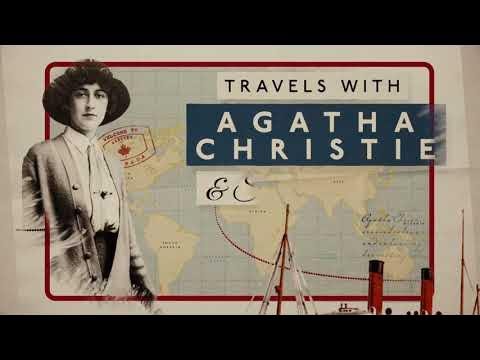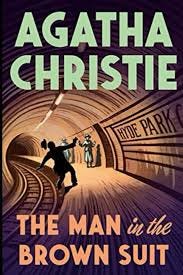Tomorrow on More 4 (also on BritBox): Travels with Agatha Christie and Sir David Suchet.
A five-part television series in which Sir David - who in a former life (eternal on ITV3) played Poirot - replicates the year-long Grand Tour undertaken by Agatha in 1922 with her first husband Archie Christie. A dual-celebrity travelogue, in fact, with a touch of class to lift it high above the usual Tales from Romantic Italy: Stacey Solomon and Joe Swash do Verona.
Agatha was a dedicated traveller, as we all know, and her passion was ignited by this remarkable episode in which - between 20th January and 1st December 1922 - she visited South Africa, Australia, New Zealand, Hawaii and Canada. One only has to read The Man in the Brown Suit, the 1924 thriller in which Agatha’s protagonist and alter ego, Anne, undertakes the same journey, to feel the vital overflow of response:
I don’t suppose that as long as I live I shall forget my first sight of Table Mountain. It made me catch my breath and have that curious hungry pain inside that seizes one sometimes when one comes across something that’s extra beautiful . . . I knew well enough that I had found, if only for a fleeting moment, the thing that I had been looking for ever since I left Little Hampsley . . .
‘This is South Africa,’ I kept saying to myself industriously. ‘You are seeing the world. This is the world. You are seeing it.’
In fact Agatha had already been to Egypt - came out there as a debutante, which in 1909 was the cheap way of doing things - but her experience was very much Knightsbridge-over-Sands. She wrote her first, unpublished novel (not crime fiction, full of promise) based upon the social round that she observed in Cairo; an upper-class character in Snow upon the Desert describes it as:
Egypt (social Egypt, not the tourists’ Egypt, all mummies and tombs and pyramids, but our Egypt)…
There is mockery in that line; Agatha always looked beyond the hierarchical society to which she belonged, while at the same time valuing it, and knowing full well that it would change without any agitating, or indeed desire, on her part. The simple fact that she was born into a particular time and class - 1890, upper-middle - and felt no guilt about it naturally causes problems today. Adaptations of her work are drearily politicized, the privileged white people who populate them cast as villains before the first drop of strychnine has even been poured. Poor Sir David, meanwhile, despite being on a very nice round-the-world gig, is obliged to deal with the fact that Agatha’s Grand Tour was, in fact, an ‘Empire Tour’, undertaken as part of a trade mission to promote the 1924 British Empire exhibition. Archie Christie (later a very successful banker) was employed as the tour’s financial advisor. Thus in episode one Sir David, visiting South Africa as the Christies had done, performs agonized mea culpas as he is lectured about Cecil Rhodes, and frets dutifully about the fact that Agatha acquired a brooch from a diamond mine founded by the arch-imperialist himself.
It is hardly Agatha’s fault that a century ago the C word (colonial) carried no stigma, as the intelligent Sir David surely knows very well, but better safe than sorry. Although this, from an interview to promote the series, is a bit of a contortion:
Christie was also a progressive. Don’t forget Poirot is not a great fan of inherited wealth and the aristocracy. He much preferred talking to those below stairs. He saw the British establishment very clearly. And that’s pure Christie.
Poirot did indeed see things clearly, that was (as they say) son métier, and although I can recall no antipathy to inherited wealth he is used, by Agatha, to make deft assaults upon the snobbish classes who characterize her detective as the kind of man who shakes hands before breakfast. She too saw things. She had great respect for servants, and even considered becoming one when she and Archie were in financial difficulties. She was enormously clever, she was sophisticated, she was bored to death by memsahibs, but to call her ‘progressive’ is frankly pushing it - as I say, she knew that time and events create their own progression - and possibly this is why not much is usually said about the Empire Tour, because she had no political view on it. She was in South Africa during the Rand Rebellion of 1922, an uprising of striking miners in which some 200 people were killed and four were executed, but she made nothing of it; the episode features in Brown Suit merely as a means to show Anne’s sang-froid under pressure. The Christies were trapped in Pretoria, as the trains stopped and bombs fell, but Agatha too refused to be unnerved. ‘They hoisted a red flag and proclaimed a Soviet government,’ she wrote to her mother, as one describing a music-hall turn.
So the best-known (harmlessly apolitical) fact about Agatha’s travels is that she went surfing in Hawaii, to which my reaction has always been why wouldn’t she? She was a fit woman of thirty-two, raised on the south coast with a lifelong love of bathing. But such is the strength of the image of ‘Agatha Christie’, the grey-haired gentlewoman at the vicarage bridge party, that the mere idea of her possessing active limbs imparts a slight frisson.
In truth, however, the Grand Tour episode is far more fascinating than its Dame Agatha does Point Break aspect; not for the travels in themselves, but for what they say about the woman who undertook them.
Keep reading with a 7-day free trial
Subscribe to Laura Thompson’s Substack to keep reading this post and get 7 days of free access to the full post archives.






